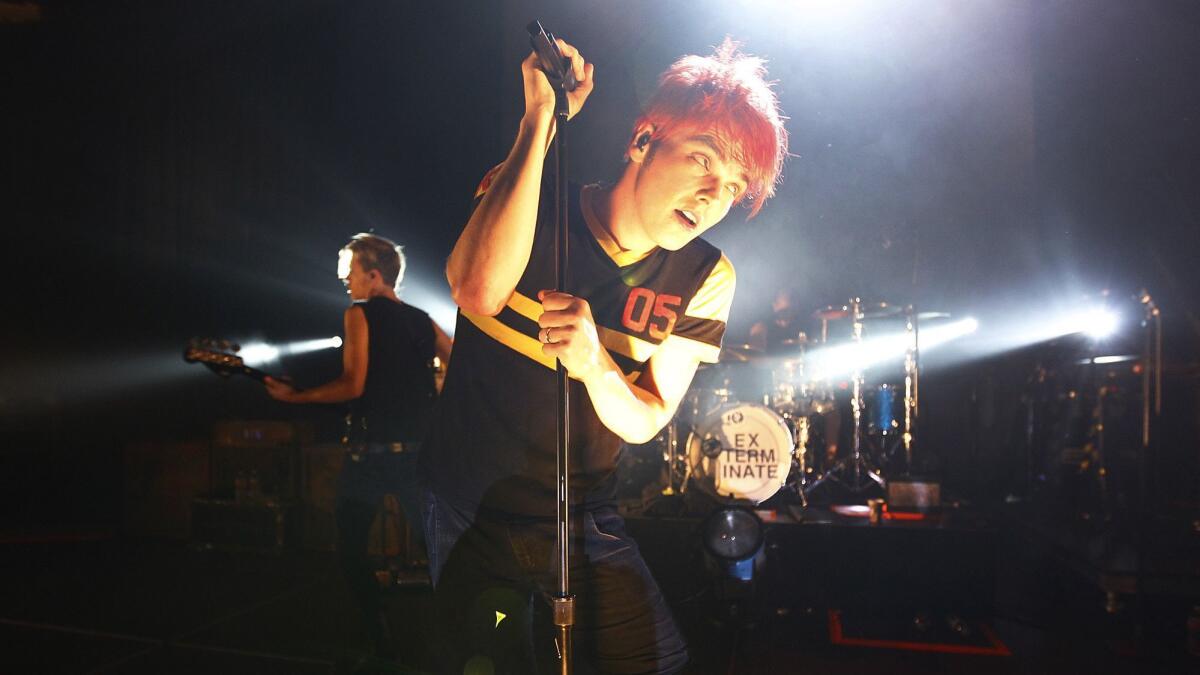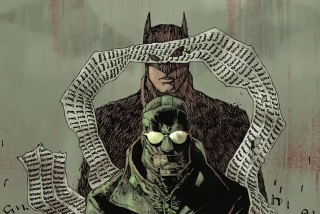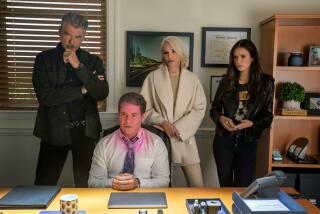From My Chemical Romance to ‘Umbrella Academy’ — the long, strange journey of Gerard Way
- Share via
During each crucial stage of his music career, Gerard Way chose a uniform. Just like a superhero in a comic book. Or maybe the villain.
In 2004, as his band My Chemical Romance broke into the mainstream, he dressed up as a demon whose jet-black hair matched his jet-black suit, set off by a bright red tie. At the top of MCR’s game in 2006, he bleached his locks white and put on a grim marching-band outfit, like Sgt. Pepper ready to lead a funeral procession. After Way released his solo album in 2014, his electric cherry hairdo bounced off his sleek, royal-blue suit. There was always a look.
But on a recent morning visit to his home in Eagle Rock, Way, 41, appeared far less put together. Wispy whiskers sprouted on his still-boyish face. His unkempt hair was its natural dark brown for once. An oversized Army fatigue-style jacket and pants set from designer Greg Lauren hung off his body.
It looked like the kind of comfy ensemble you’d settle on during a chilly day when there isn’t much of a reason to leave the house. Still, that same ensemble has continued to show up in Way’s publicity images for “The Umbrella Academy,” the new Netflix show that was inspired by the comic book series he created and where he’s credited as a co-executive producer.
On the set of ‘Umbrella Academy,’ Netflix’s next play in TV’s superhero wars »
He had found a new uniform befitting a writer of fantastical universes, not the star of them. It’s the job he’s been focusing on for the past 2½ years.
Way has emerged as a singular and respected voice in comics, whose contributions aren’t considered just a vanity side project. He’s a talented writer who embraces the bizarre and the postmodern possibilities of the medium. Issues of “The Umbrella Academy” have become increasingly and joyfully complex, while his take on the weirdos in “The Doom Patrol” is reliably brain-bending.
“I’ve found over the years that all your creativity is circular. It’s the same ride going into all this stuff,” Way explained as he sat in front of a table covered in a colorful assortment of gemstones and crystals. “In my notes I’ll write a song title. Sometimes that’ll become a song, but sometimes that’ll become a short story. Sometimes that’ll become a comic. I never fully know what they’re going to be until I finally decide to do it.”
In some respects, Way’s time in one of the most popular and influential rock bands of the 21st century was a detour from the career he was supposed to have. As a high schooler in Belleville, N.J., Way wrote two issues of “On Raven’s Wings” for a small comic-book imprint. He went to the School of Visual Arts in Manhattan, where he majored in cartooning and illustration.

After watching the Twin Towers fall on 9/11 from across the Hudson River, Way was inspired to create a grand, empathetic artistic statement. He started My Chemical Romance, founding the high-concept-driven punk group with his younger brother Mikey and three other Jerseyites. Then the year after MCR’s 2006 opus, “The Black Parade” — an album about a cancer patient that features Queen-sized dramatics, a Liza Minnelli cameo, and a heavy death obsession — brought the first issue of “The Umbrella Academy.”
Made in collaboration with Brazilian artist Gabriel Bá, “Umbrella Academy” begins with the spontaneous and simultaneous birth of 43 children around the planet to women who previously weren’t pregnant. A rich inventor named Sir Reginald Hargreeves adopts seven of them and turns the kids into a crime-fighting team imbued with superpowers.
Though there are flashbacks, the action focuses on when the children have all become bitter grown-ups, reunited after the death of their unloving father.
Way’s “Umbrella Academy” burns through big, messy ideas and delights in its small, eccentric details. There’s time travel and chimpanzees who can talk and ultra-violence and an ancient mummy king weaponized for the Vietnam War. Way called it “a comic about comics.”
The first six issues, a collection titled the “Apocalypse Suite,” won the comic book industry’s Eisner Award in 2008 for best limited series. Two weeks later, Universal Pictures optioned it to make “Umbrella Academy” movies.
This was before the success of the Marvel Cinematic Universe opened up all the possibilities available for superhero properties, and most comic-book movies were hung up on retelling elaborate origin stories, which “The Umbrella Academy” dispenses with over only a few pages. Way worked with screenwriters on draft after draft, but nothing got greenlighted. When the film option ended, “Umbrella Academy” was repackaged into a new series for Netflix.
Comic book writers have historically had a mixed reaction to their work being reinterpreted in other mediums. Alan Moore, for example, famously decried how his comics like the “Watchmen” series have been adapted over the years.
Way is far more at peace with relinquishing control of his creations. “I could have been a lot more involved in the show,” he said. “I could have probably co-showrun it or directed some episodes. That could’ve been my life. But the comic was so important to me, I didn’t want anything more in my life.”
Steve Blackman, a veteran of FX’s “Fargo” and “Legion,” eventually took on showrunner duties for “The Umbrella Academy.” Blackman confesses to not being much of a comic book fan and said he was drawn to the dysfunctional-family aspect of the story. The Netflix series spends much more time doting on the relationships between the different members of the group than on superhero action.
In their capacity as co-executive producers, Way and Bá were both consulted during various points in the production, offering their notes on everything from the look of the uniforms to the overall tone. “He wanted a feeling of subversiveness. He wanted to keep it whimsical and odd in many ways,” Blackman said of Way. “He just didn’t want it to feel like everything else out there.”
Beyond “The Umbrella Academy,” Way has stayed busy with other comic book projects. He curates a pop-up imprint for DC Comics called Young Animal, where he chooses which titles they publish, devises the general concepts and works with other writers on their specific direction.
Review: ‘Umbrella Academy’ vs DC Universe’s ‘Doom Patrol’: A battle of misfit shows »
At the center of this endeavor is Way’s take on “Doom Patrol,” a team who have been tagged “the world’s strangest superheroes.”
This embrace of strangeness guided the rest of Young Animal’s titles, which mostly featured riffs on forgotten or unloved characters from DC’s past. “[Way] definitely has a quirkiness to him,” said Cecil Castellucci, the writer of the standout “Shade, The Changing Girl” series. “He has a real ability to see the weird and how that relates to the human heart.”
Though no Young Animal titles are being printed at moment, Way is actively scripting more “Doom Patrol” issues.
Way recently set up a recording studio at the home he shares with wife Lindsey (a visual artist who also plays bass in the band Mindless Self Indulgence) and their 9-year-old daughter Bandit. He’s begun dedicating one day of the week to making music and now uploads a new song to music streaming services every month like it was a fresh issue of a comic book hitting the stands.
In 2013, three years after My Chemical Romance released what would turn out to be their final album, “Danger Days: The True Lives of the Fabulous Killjoys,” Way developed a post-apocalyptic comic book series that finished the story that the record started. His new songs have winked at his recent writing in more subtle ways. One of his latest tracks is called “Baby You’re a Haunted House,” and in a panel of a recent issue of “The Umbrella Academy,” a character described herself with those words.
It’s all part of the cosmic swirl in Way’s expanded universe.
“Even though I’ve got a lot of things going on, I don’t see it as being ambitious and trying to be the best at everything,” he said “I see it as just constantly challenging myself and also trying to get as many of these things out of me as possible. Because if you don’t put stuff out, you don’t get ideas out. They just sit there.”
More to Read
The complete guide to home viewing
Get Screen Gab for everything about the TV shows and streaming movies everyone’s talking about.
You may occasionally receive promotional content from the Los Angeles Times.






